- Home
- Gerald Hammond
The Executor (Keith Calder Book 10) Page 5
The Executor (Keith Calder Book 10) Read online
Page 5
The front doorbell chimed suddenly.
‘Thank God!’ Keith said. ‘A few more minutes of your ghoulish curiosity and I’d probably have thrown up. I’ll go.’
A battered Land-Rover was parked on the gravel and Sir Peter Hay was standing with his back to the door, admiring the sweep of open country which sloped gently down the valley to the town. His lanky frame was clad in a threadbare kilt and his hair was an untidy mop as usual.
‘Come in, Peter.’
Sir Peter looked over his shoulder. ‘I overtook your legal pal.’
‘Near the town?’
‘No. Not far from here.’
‘Then we may as well wait,’ Keith said. Ralph Enterkin was a notoriously slow driver, often overtaken by farm machinery or old ladies on bicycles.
Mr Enterkin’s Rover crawled nervously in at the gate and up the short gravel drive and came to a halt behind the Land-Rover. While the solicitor was hoisting himself carefully out of the driver’s seat, Janet James, Wallace’s wife, slipped out of the passenger’s door. Her naturally blonde hair was the brightest thing under that day’s sun. She seemed quite unaware that her every movement seemed to demand the attention of a camera. Wallace could never understand how he had attracted anything so visually and sexually dazzling and Keith, who had known Janet since her childhood, agreed.
‘Wal wanted to keep the car,’ she said. ‘Then he can follow along if we’re still here when the shop shuts.’
‘So, of course, I offered my services,’ Mr Enterkin said. ‘Good afternoon, Sir Peter.’
Keith led them through to his study, a gracious room which never failed to remind him how he had come up in the world, even if he alone knew that the furniture was all reproduction. Molly, after dumping the dishes into soapy water with a promise of later action, joined the party and Keith had to fetch another chair before settling himself in the swivel chair behind the desk.
‘Before I bring you up to date,’ he said, ‘let’s run over the events of the week and fill in the gaps.
‘On Monday, I left on a business trip. That evening, Mrs Winterton went out. Where?’
‘To the theatre,’ Mr Enterkin said, ‘with two old friends, one of whom returned her to her home.’
‘She found her husband dead. I didn’t like to press the widow too hard for details when we met. What do we know of the circumstances?’
‘Only what’s been in the papers. Signs of entry through a ground-floor window. Winterton seems to have disturbed the thief in the upstairs sitting room and was hit, very hard, with the proverbial blunt instrument – possibly a brass book-end which was missing and, as far as I know, has yet to be found.’
‘Do we know what else was stolen? Or did he flee in a panic?’
‘That,’ Mr Enterkin said, ‘is why she wanted the inventory back. The only things which she was sure were missing were an antique gold watch and a pair of silver quaichs, both from the room where the body was found. Valuable, but not remarkably so. Presumably she is by now in a position to tell the police of anything else stolen.’
‘Isn’t that a bit odd?’ Janet said. ‘I mean, he entered downstairs but went straight up to a sitting room on the first floor.’
‘It’s not unusual,’ Mr Enterkin said. ‘Burglars often start upstairs where they’re less likely to be interrupted and where the more portable valuables such as jewellery are probably to be found. Downstairs valuables tend to be heavier.’
‘Right,’ Keith said. ‘Monday evening, Mrs Winterton returns and finds the body. Presumably she phones for the police, who spend Tuesday in feverish activity, searching for traces of the culprit, and then start looking for known thieves who could fit.
‘By Wednesday afternoon, police activity at Halleydane House has died down. They’ll still be very busy, but elsewhere. The widow, who seems to be a very strong-minded lady, has remained alone in the place. A knocker turns up and, unaware of the value of the collection, or so she says, she lets him take it away in exchange for a couple of hundred, cash. Whether he arrived by what was for him a happy chance, or followed up the news of the death, or was sent, we’ve no way of knowing at the moment.
‘It seems that he’d been on the knock in that area for a couple of days beforehand. If it was the same chap, Peter, you pinned him down as Duncan Laurie. I’d already arrived at Laurie by a different route so we can assume that we have the right man. Do we know of any other purchases than the ormolu clock?’
The baronet scratched his grey mop. ‘Another clock,’ he said. ‘A tallcase, slightly damaged, the face painted with a scene of shepherds and milkmaids. He also came across a tulipwood games table which he very much wanted, but he didn’t have the price on him in cash and the owner wasn’t taking a cheque. He put down a deposit of a hundred pounds and promised to return.’
‘That ties it up, then,’ Keith said. ‘Duncan Laurie was strapped for working capital. No knocker would work that way if he could possibly avoid it. The seller would almost certainly ask around and find out that he was being offered too little. Which means, of course, that Laurie would be easily tempted by any kind of a crooked deal. And I’ve seen the clock.’
‘Where?’ Janet asked.
‘Be patient a little longer. All will be revealed. But if we jump around we’ll miss something important. Nobody sold him a dower chest?’
‘Not that they told me,’ Sir Peter said. ‘But I could only phone the larger and more likely places. If it came out of some semi with a few of great-granddad’s pieces cluttering up the place, I wouldn’t be likely to hear.’
‘I suppose,’ Mr Enterkin said, ‘that you’ve had no response to the enquiries which my secretary made to the dealers?’
‘Nothing,’ Molly said.
‘There was one odd coincidence,’ said the solicitor. ‘My secretary tells me that she was more than once met with the comment that a similar enquiry had been received recently. They wanted to be assured that it was not the same enquiry arriving through different channels. She was able to reassure them.’
‘Probably the original seller changed his or her mind,’ Keith said. ‘It might be worth going back to the dealers and finding out who made the earlier enquiry.
‘We’ll move on again. Thursday. Not much seemed to happen, except that I returned from my trip and got the news. Mrs Winterton confessed the error of her ways. And I asked you, Peter, to help identify the knocker who’d taken advantage of her folly and ignorance. So this morning, Friday, I went into Edinburgh for no better reasons than that it’s the nearest big city and that Mrs Winterton’s description of the man sounded as if he had an Edinburgh accent. I visited old Angus Pride. I wouldn’t trust him further than I could spit an elephant, but he’s a shrewd old devil and knows everything about everybody. We agreed that Duncan Laurie was the only Edinburgh-based knocker to fill the bill.
‘If he’d bought the guns and hadn’t already disposed of them, they’d be in his store in Waterman’s Lane, so I went down there.’
‘What about Michael Winterton?’ Molly said.
‘You’re right, I’d forgotten. Michael, the late Mr Winterton’s son, caught me outside Angus Pride’s shop. He’s another one who’s strapped for capital. He hadn’t much to say for himself except that he hoped I’d do what I could to settle the estate quickly. I pointed out that my hands were tied and that, in any case, he might not have anything coming.’
‘He knew about his stepmother’s stupidity then?’ Mr Enterkin said.
‘Yes. Family grape-vine, I suppose. I got rid of him as quickly as I could and hared off down to Waterman’s Lane. I got no answer at the door, which was unlocked, so I looked inside. And I found Duncan Laurie with his throat cut. It was meant to look like suicide but I don’t believe it and the police, once they’ve had time to investigate, won’t believe it either.’
Molly, who knew the story, sat quietly but the others produced a momentary babel of questions and comment. But they sat in rapt attention as Keith described the scene and outline
d his few reasons for believing that Laurie had not died by his own hand.
‘Some important points,’ Keith went on, ‘are these. One, there was a tallcase clock on the workbench with a painted dial which could well have shown a scene of shepherds and milkmaids, I didn’t look too closely. Somebody had started work, repairing damage to the top of the case. Two, there was a dower chest not far from the body. And, three, I managed to sneak a look inside his pocket diary, which was on the desk in front of him. He only used it for reminders so it didn’t tell me very much; but the only entry for Thursday referred to a D. Bruce.’
Keith paused.
‘You can hardly be referring to the lady at the post office,’ Mr Enterkin said at last. ‘Nor yet to the actor of that name. You will have to enlighten us.’
‘Think,’ Keith said. ‘It’s not so very many years since we had dealings with a D. Bruce. He was the one man who could dispose of a unique collection obtained in dubious circumstances without making waves.’
‘You mean Danny Bruce?’ Molly squeaked. ‘The antique-dealer.’
‘And fence,’ Sir Peter said thoughtfully. ‘I recall that he was a fence in a big way of business before his downfall. He’s out, then?’
‘Ages ago,’ Keith said. ‘And his daughter kept the Glasgow antique shops running while he was inside. I’ve no doubt he’s been up to his old tricks long since.
‘Under D. Bruce, the diary also said Rutherglen and then a scribble which might have been “Guns”.
‘“Dearie me,” I said, “oh dearie, dearie me,” or words to that effect.’
‘I take it,’ Mr Enterkin said, ‘that you did not draw any of your conclusions to the attention of the police.’
‘They’ll get there soon enough,’ Keith said. ‘Meantime, the last thing I wanted was to get caught up in a murder enquiry and spend the rest of the day hanging around in case somebody thought of any more questions, while Danny Bruce was spiriting the guns away to hell and gone.
‘So, as soon as I could get a moment’s peace, I slipped away to the phone. I called his shop in Buchanan Street and Danny Bruce was there all right. I lowered the pitch of my voice and tried to put on an Aberdeen accent, and I said, “This is a friend. Don’t try to get the guns away. The police know and they’re watching for them.” Then I hung up.’
‘That’ll just make him hide them away all the deeper,’ Molly objected.
‘Probably. But at least it should keep them in one place for a while,’ Keith said. ‘You remember what a cautious devil Danny was, always looking over his shoulder and jumping at shadows. He won’t move them until he’s absolutely sure that it’s safe. Which gives me time to think what I’m going to do.’
‘What are you going to do?’ Janet asked.
‘Pardon my French but I’m buggered if I know.’
‘Pull the other one,’ Janet said after a pause.
‘I beg your pardon?’ Keith said coldly.
‘So you should,’ said Molly.
‘I can see why you wanted Sir Peter and Ralph here,’ Janet persisted. ‘But there’s no obvious reason why you wanted Wal. I came instead of him and you haven’t addressed a word to me. Therefore you wanted Wal to do something I wouldn’t have approved of and now you’re thinking you can phone him as soon as I’ve gone.’
‘Everybody thinks they can read me like a book today,’ Keith said.
‘For years,’ Janet said, ‘you’ve been telling us to try and think like the other fellow, but you don’t like it when we apply it to you. It works in business and it works in other ways too. Come on. What did you want Wal to do?’
Keith threw up his hands. ‘All right,’ he said. ‘All bloody right. You’ll all remember. Several years ago, we went chasing after two insurance company rewards.’
‘We got them, too,’ Molly said cheerfully. ‘That’s how we bought this house.’
‘But Danny Bruce got in the way and instead of making a packet he got himself jugged. Even if I hadn’t been doing business with him before that, he’d have had cause to remember me.
‘What I wanted to do, and what I was going to suggest to Wal, was to go through, take a look at his shops and see if anything showed which could be traced back to Robin Winterton or to Duncan Laurie and maybe pretend to represent a rich customer busting to buy some of the collection and no questions asked.’
‘No,’ Janet said. ‘Out of the question. Put it out of your tiny mind. Forget it. Find some other sucker.’
‘Wal’s the only one of us who came on the scene after that particular event,’ Keith pointed out. ‘The rest of us were called at the trial.’
‘Tough,’ Janet said. ‘My recollection of Danny Bruce is of a real smoothie with an icicle for a heart and a daughter who’d drop a grenade in a blind man’s cup just for laughs. And neither of them went anywhere without one or more hard men for bodyguards. Wal’s known to be your partner, and his stammer would make him easy to trace. No, thank you very much. Leave Wal out. Hire somebody who can’t be traced back to us.’
‘I get the message,’ Keith said. ‘You don’t have to put it to music and sing it. Well, would you make a phone-call for me?’
‘He’s heard me on the phone.’
‘You were using your Cheltenham-and-Girton voice. Be American. You’re secretary to somebody you won’t name over the phone but the cash is there. A pal tipped your boss off that there’s maybe a couple of Scottish long guns coming on the alternative market and he’d like to bid.’
‘Same answer,’ Janet said. ‘Get somebody else. Hire an actor.’
‘I might do that,’ Keith said. ‘Or. . . . I wonder if one of the family would do it. They have the strongest incentive. Would Mrs Winterton’s son be keen to redeem his mum’s disastrous blunder?’
‘I wouldn’t go near him if I were you,’ Molly said. ‘I don’t think he’d be your cup of tea at all. He used to turn up at some Camera Club meetings I went to in Edinburgh. His boy-friend was usually with him,’ she finished, pink in the face.
‘Oh,’ Keith said. The prospect of trying to coax a homosexual had less than no appeal for him. He changed tack. ‘Janet, you remember Inspector Cathcart of Strathclyde, the one who took such pleasure in arresting Danny Bruce at last?’
‘Yes, of course.’
‘He rather fancied you,’ Keith said. ‘Would you give him a ring, renew old acquaintance? He owes us a favour. He could pay it off by warning us if Danny Bruce seems to be moving a heavy load around in a secretive manner.’
‘That much I’ll do,’ Janet said.
‘Well, while you’re on the phone. . . .’ Keith set about persuading Janet to call Danny Bruce. He could usually twist her round his finger in the end.
*
When the visitors were gone, Keith settled down in the study with the intention of making life very difficult for anybody trying to dispose of Robin Winterton’s collection.
Even after so many years largely spent trading in antique guns, he was amazed to discover how many potential buyers he could think of. Dealers, investors, curators and collectors, they were all in his mind. He knew how each worked and whether or not he was honest. He knew whether a phone-call was enough or if a letter would be necessary. He knew when to appeal man-to-man and when to include a thinly-disguised threat. His message was always the same: ‘If you’re offered anything which might have come from the Winterton collection, no matter how good the source or the provenance seems to be, I want to know at once.’
He was interrupted once by an incoming phone-call. He lifted the receiver quickly, hoping that it was news.
‘This is Philip Stratton,’ the caller said. ‘You remember me?’
It took a second or two for the name to evoke a tall, neatly-dressed figure topped by hair of purest silver. ‘Reporter,’ Keith said. ‘The Scotsman. How are you doing?’
‘Reasonably,’ Stratton said. ‘I left the Scotsman. I’m freelance now. I was tired of being told which stories to follow up and which to leave alone.’
<
br /> That made sense. Philip Stratton had had a talent for investigative journalism. He might make a living as a freelance even in such a fiercely competitive profession. ‘I wish you luck,’ Keith said.
‘You can do a little more than that – you can feed me a story. I heard a whisper that you were the executor of the Robin Winterton who was killed during a robbery a few days ago.’
‘True,’ Keith said.
‘Today, things being quiet, I was doing the rounds of the police stations and your name pops up again, this time as the finder of an apparent suicide, although the police are being a bit cagey as to whether they’re treating it as such. An antique-dealer.’
‘Also true.’
‘What’s the connection?’
Keith thought quickly. The press would have the whole story all too soon, but for the moment he would not want that sort of publicity alerting every petty crook and con-man. ‘I’ve no comment to make,’ he said. ‘But give me your number. I may have something for you in a day or two.’
Chapter Four
Molly was downstairs ahead of her family in the morning but, before she could take her breakfast, Keith had followed her down and was scrambling through his own meal as if it might be his last. Within five minutes he was only anchored to the table by his second cup of coffee and by the fact that he was still lacing his shoes.
‘What’s the hurry?’ Molly demanded. ‘Aren’t you waiting for Deborah?’
‘You really want me to take her along? I nearly walked her into a pool of blood yesterday. I’m going through to Glasgow. See what the Strathclyde fuzz have dug up and take a look at Danny Bruce’s shops for myself.’
‘Well, don’t drive too fast. If you’re in such a hurry—’
‘I’ve plenty of time to get to Glasgow,’ Keith said. ‘I’m just in a hurry to get out of here. Unless the Edinburgh force is slacker than I think it is, they’ve spotted by now that Duncan Laurie was tweeped—’
‘Was what?’

 Home to Roost
Home to Roost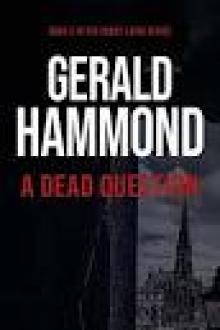 A Dead Question
A Dead Question Twice Bitten
Twice Bitten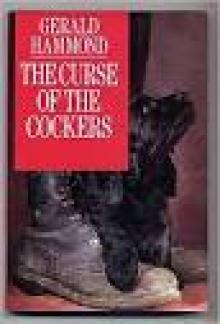 The Curse of the Cockers
The Curse of the Cockers In Loving Memory
In Loving Memory Illegal Tender (Three Oaks Book 12)
Illegal Tender (Three Oaks Book 12) Cold Relations (Honey Laird Book 1)
Cold Relations (Honey Laird Book 1)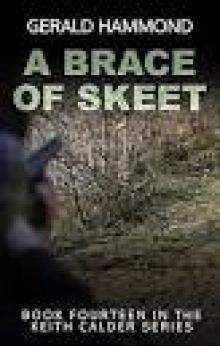 A Brace of Skeet
A Brace of Skeet Silver City Scandal
Silver City Scandal Sauce For the Pigeon
Sauce For the Pigeon Cold Relations
Cold Relations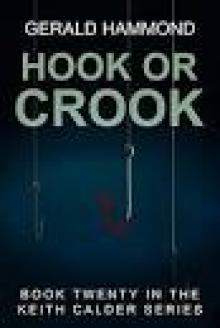 Hook or Crook
Hook or Crook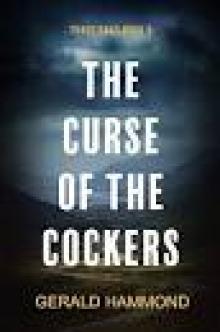 The Curse of the Cockers (Three Oaks Book 5)
The Curse of the Cockers (Three Oaks Book 5) Snatch Crop
Snatch Crop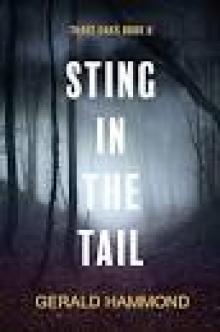 Sting in the Tail (Three Oaks Book 6)
Sting in the Tail (Three Oaks Book 6)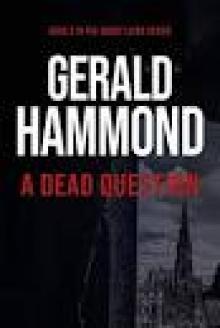 A Dead Question (Honey Laird Book 2)
A Dead Question (Honey Laird Book 2)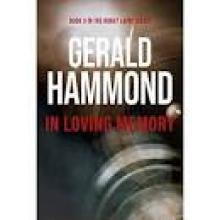 In Loving Memory (Honey Laird Book 3)
In Loving Memory (Honey Laird Book 3) Thin Air
Thin Air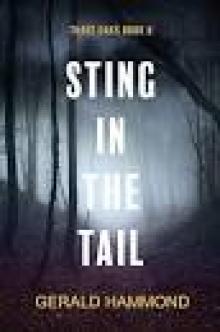 Sting in the Tail
Sting in the Tail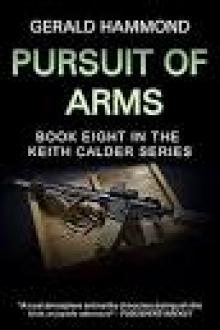 Pursuit of Arms
Pursuit of Arms The Game
The Game Give a Dog a Name (Three Oaks Book 4)
Give a Dog a Name (Three Oaks Book 4) Fair Game
Fair Game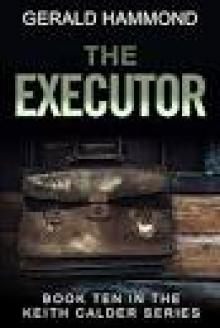 The Executor (Keith Calder Book 10)
The Executor (Keith Calder Book 10) Whose Dog Are You? (Three Oaks Book 2)
Whose Dog Are You? (Three Oaks Book 2)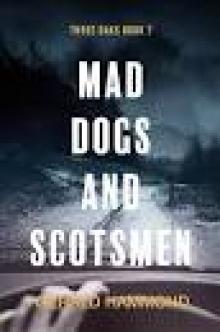 Mad Dogs and Scotsmen (Three Oaks Book 7)
Mad Dogs and Scotsmen (Three Oaks Book 7) Cousin Once Removed
Cousin Once Removed The Worried Widow
The Worried Widow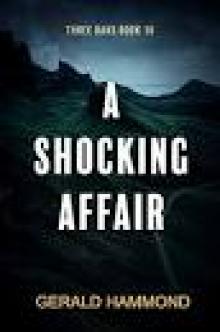 A Shocking Affair
A Shocking Affair Dead Weight (Three Oaks Book 11)
Dead Weight (Three Oaks Book 11) Whose Dog Are You
Whose Dog Are You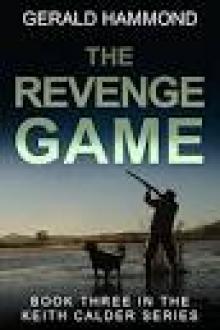 The Revenge Game
The Revenge Game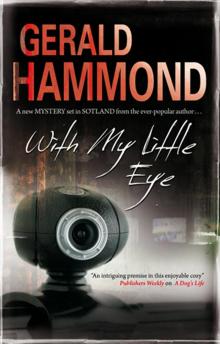 With My Little Eye
With My Little Eye Doghouse (Three Oaks Book 3)
Doghouse (Three Oaks Book 3)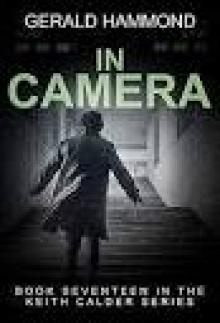 In Camera
In Camera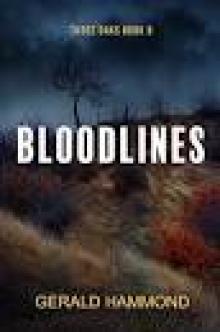 Bloodlines (Three Oaks Book 8)
Bloodlines (Three Oaks Book 8)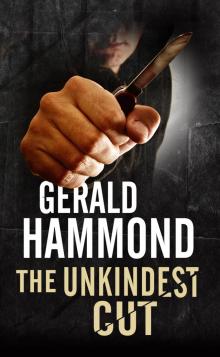 The Unkindest Cut
The Unkindest Cut